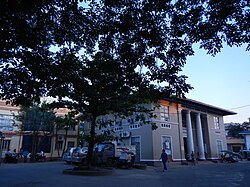Hagonoy, Bulacan
| Hagonoy | ||
|---|---|---|
| Municipality | ||
| Bayan ng Hagonoy (Town of Hagonoy) | ||

Municipal hall
|
||
|
||
| Nickname(s): The Aquaculture Capital of Bulacan Leviticus Town |
||
| Motto: Ahon Hagonoy (Ascend Hagonoy) | ||
 Map of Bulacan showing the location of Hagonoy |
||
| Location within the Philippines | ||
| Coordinates: 14°50′N 120°44′E / 14.83°N 120.73°ECoordinates: 14°50′N 120°44′E / 14.83°N 120.73°E | ||
| Country | Philippines | |
| Region | Central Luzon (Region III) | |
| Province | Bulacan | |
| District | 1st District | |
| Founded | 22 April 1581 | |
| Barangays | 26 | |
| Government | ||
| • Mayor | Raulito T. Manlapaz Sr. (Liberal party) | |
| • Vice mayor | Pedro Santos Jr. | |
| Area | ||
| • Total | 103.10 km2 (39.81 sq mi) | |
| Highest elevation | 20 m (70 ft) | |
| Population (2015 census) | ||
| • Total | 129,807 | |
| • Density | 1,300/km2 (3,300/sq mi) | |
| • Poverty rate |
|
|
| Demonym(s) | Hagoeño | |
| Time zone | PST (UTC+8) | |
| ZIP code | 3002 | |
| IDD : area code | +63 (0)44 | |
| Income class | 1st Class; Urban | |
| Electricity | Manila Electric Company | |
| • Consumption | 33.57 million kWh (2003) | |
Hagonoy (Filipino: Bayan ng Hagonoy; Kapampangan: Balen ning Hagonoy) is a first class urbanmunicipality in the province of Bulacan, Philippines. According to the 2015 census, it has a population of 129,807 people.
It is the birthplace of Former Senator Gat. Blas F. Ople, a famous journalist and politician who had served several high-ranking positions in the executive and legislative branch of the Philippine government including Senate President, Secretary of Foreign Affairs and Ministry of Labor.
Hagonoy was first mentioned in the history of the Philippines in 1571 . Even before the "blood compact" between Spain's Miguel Lopez de Legazpi and the Philippines' Sikatuna was made, the place was already known as Hagonoy. The land consists of archipelagic marsh and river tributaries going to the sea, where the first ancestors of this town probably took this way to reach Hagonoy.
According to research and studies, there are Malay groups from Borneo, Sumatra, and Java who came to the island of Panay. It is considered as the first wave of travelers who lived and resided on that part of the country long before Ferdinand Magellan’s discovery of the Philippines. The second blast came, with their families and clans migrating in the Visayas region. The rest of the families on the second wave continue to travel and reach the islands of Luzon, until they arrive at Manila Bay. Some of them stay on the coastal side of the bay and built communities (believed that this came from other parts of Indonesia and Malaysia), while others went into the rivers and searched for living in the forests nearby. They maybe also the group passed by estuary of the Rio Grande de Pampanga and maybe the first natives in the place.
...
Wikipedia


